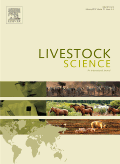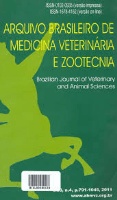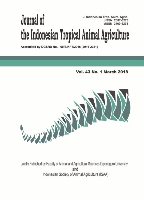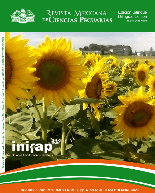
Translational Animal Science
Scope & Guideline
Enhancing Animal Welfare Through Translational Research
Introduction
Aims and Scopes
- Nutritional Science and Diet Formulation:
This core area encompasses research on feed composition, dietary supplements, and their impacts on animal growth performance, nutrient absorption, and overall health, focusing on species such as cattle, pigs, poultry, and more. - Animal Health and Disease Management:
Research in this area includes studies on disease prevention, treatment protocols, and the effects of various management practices on animal health, emphasizing the importance of immunology and veterinary interventions. - Meat Quality and Processing:
This scope involves investigations into factors affecting meat quality traits, such as tenderness, flavor, and nutritional content, as well as the impact of processing techniques on meat products. - Animal Genetics and Breeding:
Studies within this theme focus on genetic selection, breeding strategies, and their effects on performance traits in livestock, aiming to improve productivity and resilience. - Welfare and Behavior:
Research in this area addresses the welfare of animals in production systems, including behavioral studies and humane handling practices that contribute to improved animal well-being. - Environmental Impact and Sustainability:
This scope involves research on the ecological footprint of animal production systems, including studies on emissions, resource use efficiency, and sustainable practices.
Trending and Emerging
- Precision Livestock Farming:
Emerging technologies such as sensors, data analytics, and machine learning are increasingly being applied to monitor and improve livestock management, enhancing productivity and animal welfare. - Alternative Protein Sources:
Research focusing on the use of insect meals, algae, and plant-based proteins as sustainable feed alternatives is gaining attention, reflecting a shift towards more environmentally friendly animal production systems. - Nutritional Strategies for Climate Resilience:
Studies investigating dietary interventions aimed at reducing greenhouse gas emissions from livestock, such as the inclusion of specific feed additives or alternative feed ingredients, are becoming more prevalent. - Animal Welfare and Ethical Considerations:
With increasing consumer demand for humane treatment of animals, research addressing welfare standards and ethical considerations in animal husbandry is gaining importance. - Health and Immunity Enhancement:
Research focusing on nutrition and management practices that boost immune responses in livestock, particularly in the context of disease outbreaks, is on the rise.
Declining or Waning
- Traditional Antibiotic Use in Animal Production:
Research focusing on the use of antibiotics for growth promotion in livestock has seen a decline as the industry moves towards antibiotic-free practices and alternative methods for disease management. - Conventional Feed Additives:
There has been a noticeable decrease in studies centered around traditional feed additives, as newer alternatives such as probiotics and prebiotics gain traction and interest in animal nutrition. - Pasture-Based Systems:
Research on extensive grazing and pasture-based systems seems to be waning as more emphasis shifts towards intensive and controlled feeding systems that optimize production efficiency.
Similar Journals

Livestock Science
Elevating Veterinary Practices through Open Access InsightsLivestock Science is a prestigious academic journal published by ELSEVIER, dedicated to the comprehensive study of animal science and veterinary medicine. With an esteemed Q1 ranking in both the fields of Animal Science and Zoology, as well as Veterinary (miscellaneous) in 2023, this journal is recognized for its impactful contributions to the understanding of livestock health, production, and management. The journal has consistently earned its high position within Scopus, ranking 26th out of 194 in General Veterinary and 86th out of 490 in Animal Science and Zoology, reflecting its significant influence within the research community. The open access policy allows for broader dissemination of knowledge, promoting collaboration among researchers, professionals, and students alike. With its continuous publication cycle from 2006 to 2024, Livestock Science remains an essential resource for anyone interested in the advancements, challenges, and innovations within the field of livestock management and veterinary practices.

Italian Journal of Animal Science
Championing open access to animal science breakthroughs.Italian Journal of Animal Science (ISSN: 1594-4077; E-ISSN: 1828-051X), published by Taylor & Francis Ltd, serves as a pivotal platform for the dissemination of cutting-edge research in the fields of animal science and zoology. Since its transition to Open Access in 2002, it has broadened its reach, allowing researchers from around the globe to share their findings and engage in critical dialogue. With its esteemed Q1 ranking in the 2023 category of Animal Science and Zoology and a notable position in the Scopus rankings—ranked 65 out of 490—this journal is a leader in driving the advancement of knowledge in animal science. The Italian Journal of Animal Science aims to publish original research articles, reviews, and methodological papers that contribute to the understanding of animal biology, welfare, nutrition, and conservation, making it a vital resource for researchers, professionals, and students dedicated to advancing the field. Based in the United Kingdom, and with a commitment to excellence, the journal is poised to continue fostering scholarly communication through 2024 and beyond.

ARQUIVO BRASILEIRO DE MEDICINA VETERINARIA E ZOOTECNIA
Bridging knowledge gaps in veterinary and animal sciences.ARQUIVO BRASILEIRO DE MEDICINA VETERINARIA E ZOOTECNIA, an esteemed publication in the field of veterinary medicine and animal science, has been a vital resource for researchers and professionals since its inception in 1996. Published by the ARQUIVO BRASILEIRO MEDICINA VETERINARIA ZOOTECNIA, this journal is recognized for its open-access model, allowing widespread dissemination of knowledge since 1999. With a 2023 Scopus ranking placing it in the 25th percentile within the veterinary field, ARQUIVO BRASILEIRO is categorized in Q3 in Veterinary (miscellaneous), highlighting its commitment to scholarly excellence. The journal's scope encompasses a diverse range of topics related to veterinary medicine and zootechnics, making it a crucial platform for advancing research and professional practice. Situated in Belo Horizonte, Minas Gerais, Brazil, it serves not only the local community but also an international audience, fostering collaboration and innovation in veterinary sciences. As such, ARQUIVO BRASILEIRO is an invaluable asset for students, researchers, and practitioners looking to stay at the forefront of veterinary research.

TROPICAL ANIMAL HEALTH AND PRODUCTION
Pioneering research for thriving tropical livestock.Tropical Animal Health and Production is a prominent academic journal dedicated to advancing the field of animal health and production in tropical environments. Published by Springer, this journal has been a pivotal platform for researchers and professionals since its inception in 1969, serving as a vital resource for innovative studies and advancements up to 2024. With impactful research findings, it holds a respectable Q2 ranking in both Animal Science and Zoology, and Food Animals, demonstrating its significance within these fields. The journal’s commitment to high-quality research is further reflected in its Scopus rankings, with a notable position in Agricultural and Biological Sciences and Veterinary Food Animals. Although it is not an open-access publication, the insights and knowledge shared within its pages are invaluable for those engaged in tackling the challenges of animal health and production in the tropics. Researchers and students will find Tropical Animal Health and Production an essential source for the most recent advancements and practices in veterinary science and animal care for food-producing species.

Journal of the Indonesian Tropical Animal Agriculture
Pioneering Research for Tropical Animal AgricultureJournal of the Indonesian Tropical Animal Agriculture is an esteemed peer-reviewed journal published by UNIV DIPONEGORO, focusing on the dynamic fields of animal science and veterinary medicine. Since its inception in 2009, the journal has maintained an open access policy, ensuring that valuable research is freely available to the global scientific community. Based in Indonesia, the journal has adapted to the evolving agricultural landscape and now contributes significantly to both local and international discourse on tropical animal husbandry. With a Scopus rank placing it within the 36th percentile for general veterinary sciences and the 25th percentile for animal science and zoology, it is emerging as a valuable resource for researchers and professionals alike. The journal covers a broad range of topics within its scope, fostering innovative approaches and solutions tailored to the unique challenges of the tropical environment. By exploring critical issues in animal agriculture, this journal not only enhances academic knowledge but also supports sustainable practices within the industry. We invite researchers, students, and professionals in the realm of veterinary science and animal agriculture to engage with the rich array of research presented in this journal.

CANADIAN JOURNAL OF ANIMAL SCIENCE
Advancing Animal Science Knowledge Since 1975Canadian Journal of Animal Science, published by Canadian Science Publishing, stands as a pivotal platform in the fields of Animal Science and Zoology, reflecting its commitment to advancing knowledge and research in these crucial areas. Operating since 1975, with dedicated publication since 1993, this journal boasts an impactful history and has established itself within the academic community, holding a 2023 Q2 category rank in Animal Science and Zoology, and a Q3 rank in Food Animals. With its ISSN 0008-3984 and E-ISSN 1918-1825, the journal is accessible to a wide audience, promoting collaboration and the dissemination of innovation across borders. Although not an open-access journal, its valuable insights and research findings serve as essential resources for researchers, professionals, and students striving to enhance their understanding of animal science, veterinary studies, and agricultural practices. As the field of animal science continues to evolve, the Canadian Journal of Animal Science remains a vibrant and influential part of this dynamic landscape.

Tropical Animal Science Journal
Advancing Knowledge in Tropical Animal ScienceTropical Animal Science Journal, ISSN 2615-787X, E-ISSN 2615-790X, is an esteemed open-access journal published by the Bogor Agricultural University, Faculty of Animal Science. Launched in 2018, this journal serves as a pivotal platform for disseminating high-quality research in the fields of Animal Science, Food Animals, and Veterinary Medicine. With its significant presence in Indonesia and a commitment to scientific innovation, it has achieved a Q3 ranking in Animal Science and Zoology and Food Animals, as well as a Q2 ranking in Veterinary (miscellaneous) as of 2023. The journal also enjoys favorable Scopus rankings, placing it in the 61st percentile for General Veterinary and demonstrating its relevance and impact in the academic community. As an advocate for open-access publishing since its inception, the journal enhances accessibility to critical research findings, making it an invaluable resource for researchers, professionals, and students alike who aim to advance their knowledge and contribute to the fields of tropical animal science.

Applied Animal Science
Fostering Insights for a Sustainable Future in Animal SystemsApplied Animal Science, published by Elsevier Science Inc, is an esteemed journal that has quickly made its mark in the fields of Animal Science and Food Science since its inception in 2019. With an ISSN of 2590-2873 and an E-ISSN of 2590-2865, this journal has received commendable recognition, achieving a Q2 ranking in both categories as of 2023. Encompassing a broad scope that integrates cutting-edge research and practical applications, Applied Animal Science seeks to disseminate knowledge that advances the well-being of animal systems and food safety. Researchers and professionals in the agricultural and biological sciences benefit from its high-quality articles, which are ranked #152 out of 490 and #200 out of 389 in their respective fields according to Scopus rankings. While currently not open access, the journal remains accessible to a global audience of scholars eager to explore innovative findings and robust methodologies. As it continues to grow through 2024 and beyond, Applied Animal Science aims to be a pivotal platform for fostering knowledge exchange and inspiring future studies in its domain.

Revista Mexicana de Ciencias Pecuarias
Exploring New Frontiers in Animal Science and WelfareRevista Mexicana de Ciencias Pecuarias, published by INIFAP-CENID PARASITOLOGIA VETERINARIA, is a prominent open-access journal since 2010 that caters to the fields of Animal Science and Veterinary Medicine. Based in Mexico, this journal addresses critical issues in animal health, production, and welfare, making it instrumental for researchers, professionals, and students seeking to advance their knowledge and practices. With an impact factor that reflects its growing influence, particularly in the Q3 quartile rankings in both Animal Science and Zoology as well as Veterinary (Miscellaneous) categories, the journal provides a vital platform for the dissemination of innovative research and findings. Additionally, its Scopus Ranks position highlights its role in publishing significant contributions to the fields of Veterinary Science and Agricultural Biology. The journal fosters a collaborative learning environment through its open-access model, ensuring that valuable insights are accessible to a wide audience. For those committed to enhancing animal well-being and advancing veterinary practices, the Revista Mexicana de Ciencias Pecuarias stands as a key resource through its rigorous peer-reviewed publication process and commitment to scientific excellence.

ANIMAL SCIENCE PAPERS AND REPORTS
Advancing Animal Science through Interdisciplinary ResearchANIMAL SCIENCE PAPERS AND REPORTS, published by the Polish Academy of Sciences, Institute of Genetics and Animal Biotechnology, is a distinguished platform for interdisciplinary research reflecting the evolving fields of Animal Science, Biotechnology, and Genetics. With an ISSN of 0860-4037 and an E-ISSN of 2300-8342, this journal serves as an essential resource for researchers and professionals aiming to advance their understanding and apply innovative methodologies in veterinary science and animal biotechnology. Despite being classified in Quartile 4 across several categories in 2023 and noting a notable country-based focus in Poland, it continues to provide valuable insights into animal genetics and biotechnological advancements, particularly as it converges its content from 2007 to 2024. While currently not an open access journal, ANIMAL SCIENCE PAPERS AND REPORTS is committed to upholding academic rigor, making it a key asset for students, researchers, and industry professionals looking to contribute to and stay informed in these vital scientific areas.